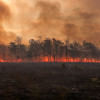Take steps to ensure our food security

As the country struggles with soaring food prices, the government's response so far has largely focused on addressing immediate challenges through various measures, including price caps, import tariff reductions, efforts to cut middlemen from the supply chain, etc. If properly executed, these initiatives will offer some relief, but there are larger factors posing threats to our food security that demand equal attention. This is according to a report by this daily that highlighted how extreme weather events are causing a chain reaction that is proving harder to recover from. These events have caused massive agricultural and financial losses as well as production shortfalls which, combined with supply-chain disruptions and manipulations, are jeopardising food supplies and driving up prices.
Since May 2023, Bangladesh has experienced more than a dozen extreme weather events—four cyclones, nine incidents of flooding, and multiple spells of heavy rains, heatwaves, and cold waves. These events have severely affected farmers as well as overall crop production, with the Department of Agriculture Extension (DAE) estimating the damage of four to 15 percent of crops in seven to 50 districts. For example, the two recent floods in Chattogram, Sylhet, and Mymensingh divisions damaged an estimated yield of about 10 lakh tonnes of Aman just before the plants were to flower. The unprecedented flooding in the eastern region in August-September was also quite damaging, with the agriculture and forestry sector alone suffering a loss of Tk 5,169.71 crore.
Through these floods and Cyclone Remal in 2024, the DAE estimates that the total damage to crops would amount to Tk 6,968.95 crore. Because of such losses, experts fear that the government's crop production target for this year may not be achieved, which only means further risks to our food security. The question is, how do we minimise the impact of extreme weather events on our agricultural production and food supplies? Given the current trend of climate change, these events will likely grow in number and frequency in the coming years, so the government must plan accordingly. True, Bangladesh has decades of experience in dealing with natural disasters, but we must align our disaster response with our agricultural goals to ensure that our food security is not threatened under any circumstances.
Experts have recommended various measures that can help us—and our farmers—which deserve careful consideration. For example, they have urged the government to consider reducing import duties on essential agricultural commodities, including farm inputs. Ensuring uninterrupted access to agricultural loans, seeds, and fertilisers for farmers is crucial as they are at the centre of our food security. We also should adopt more resilient crop varieties that can withstand extreme weather, and enhance our early warning system. These are just some of the measures that can be taken considering the gravity of the challenge facing us.

 For all latest news, follow The Daily Star's Google News channel.
For all latest news, follow The Daily Star's Google News channel. 









Comments